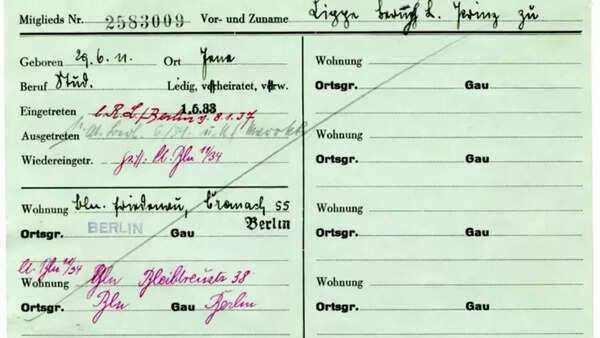[ad_1]
According to the BBC, the revelation came after Flip Maarschalkerweerd, a former head of the palace archives, found the card while going through the prince’s personal belongings after his death.
Flip Maarschalkerweerd said that he stumbled upon the NSDAP membership card while cataloging the prince’s archives after his death.
Flip also said to NRC Handelsblad newspaper that he came across a note from 1949 written by a US military administrator in Germany, Lucius Clay which revealed that he had considered destroying the card but ultimately allowed Prince Bernhard to decide its fate.
This revelation has stirred significant reactions in Dutch society.
Prince Bernhard was originally a German aristocrat and he repeatedly denied any affiliation with Adolf Hitler’s NSDAP political party throughout his life.

However, historians remained skeptical of his denials.
A researcher at the Dutch institute for war studies (Niod), Gerard Aalders said he found a copy of the card in a US university archive in the year 1996.
Gerard Aalders faced criticism for this revelation at the time.
Aalders recently reaffirmed his belief on social media, stating that “Prince Bernhard lied to the bitter end about his Nazi past.”
Prince Bernhard married Dutch Princess Juliana in 1937 and escorted the Dutch royal family in exile when World War II erupted in 1940.
Despite his involvement in the Dutch royal broadcast via the BBC in 1943 and being put in charge of the unified Dutch resistance forces in 1944, British security services never fully trusted him.
He was even decorated for his role as a wartime RAF pilot.
Bernhard became the prince consort when Juliana ascended to the throne in 1948.
He consistently denied any Nazi affiliation, even stating in a 2004 interview, “I can declare with my hand on the bible: I was never a Nazi.”
But he did admit to briefly being a prospective member of two Nazi organizations during his student days, the Sturmabteilung security service and the Schutzstaffel (SS).
However, he argued in 1971 that it was necessary to some extent for academic survival at the time because if they had found out he was opposed, it would have been tricky to pass university exams.
Which was quite different from being a voluntary card-carrying member and willingly maintaining membership in Hitler’s political party from 1933 to 1936 and retaining the membership card until his passing, stated BBC.
In addition to a duplicate of the membership card surfacing in the United States during the 1990s, historian Annejet van der Zijl also discovered the prince’s student membership card in a German archive in 2010, indicating that he had been a party member since April 27, 1933.
And the recent discovery of the NSDAP membership card, as well as historical documents found in both the US and Germany, contradicts his denials.
According to BBC, Journalist Jan Tromp, who interviewed the prince extensively over the years, suggested that Prince Bernhard’s initial lie might have eventually turned into self-deception.
For many who had participated in the Dutch resistance and commemorated the liberation alongside the prince, this disclosure comes as a shock and betrayal.
Jan Tromp told De Volkskrant newspaper that, “For the prince, there was no other choice but to deny he was a member of the enemy club – a club that had destroyed the country and sent people to concentration camps.”
Following the release of an image of the membership card in Dutch media, the royal house confirmed its existence and published a picture of it.
In a statement, they emphasized King Willem-Alexander’s commitment to independent research and understanding the history of the House of Orange-Nassau in the kingdom’s history.
Several political parties and Jewish groups have called on caretaker Prime Minister Mark Rutte to initiate an investigation into the matter.
Naomi Mestrum of the Israel Information and Documentation Centre (Cidi) characterized proof of the prince’s Nazi past as adding another “black page to a painful part of recent Dutch history.”
Prime Minister Rutte acknowledged the significance of the revelation while noting that previous research had made it convincing that Prince Bernhard’s holded a membership in the Nazi party.
[ad_2]
Source link

